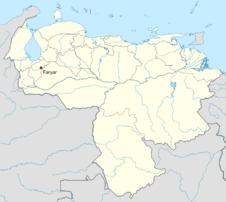State of Dakrit
Dakrit | |||||||||
|---|---|---|---|---|---|---|---|---|---|
| Anthem: Qiz'setan T'eensa | |||||||||
 Western Venezuela | |||||||||
| Official languages | Dakritic Pahdur | ||||||||
| Government | Theocratic Absolute Elective monarchy | ||||||||
| Establishment | 15 May 2012 | ||||||||
| Currency | Bolívar | ||||||||
| Time zone | VST (UTC-4:30) | ||||||||
| |||||||||
The State of Dakrit or simply Dakrit (also alternativelly spelt "Dak'krit") was the micronational holy see of the Church of the Pahun during a short period in 2012, and a micronation of the Valtir Sector. The state, though declared a sovereign entity, maintained its "not seeking for recognition as sovereign state" policy, as part of the Church. Dak'krit was a city-state. The complete ceremonial name of Dakrit was Dahm Helem Dak'krit-Saa Maruha'eet Qi'qu-samseevat, Dahm Jee' Pahunnia, meaning "Holy Sanctuary State, Eternal Plain of Goodness, Head of the Pahunnia". This name is one of the prime examples of the Dakritic Pahdur grammar left today.
Etymology
The word "Dak'krit" meant "holy temple" or "sanctuary", in Dakritic Pahdur. An alternate spelling is Dakrit. Both spellings are correct, though Dakrit is preferred by modern standards.
History

The Declaration of Autonomy (Declaración de Autonomía), the Declaratio Independentiae was signed by Richard Garrshire on 14 April, declaring himself "Emperor of the Beriners and Imperial Authority of the Berinese Empire". The Imperial Chart would later be considered the official declaration of independence of the Empire of Berin. This micronational entity was intended to be comical and not serious, which can be seen in many aspects of the political system of the Empire and its national identity as a whole. The process of "Seriousification" (Seriamiento) or the "straightening" (Enderezamiento) was the process employed to convert the Empire of Berin into a "serious, raw micronation". Of course, this is, among other things, part of the comical side of Berin.
The Empire quickly developed a simple governmental system. An absolute monarchy seemed like a very useful and coherent idea due to the number of the population and the sphere of influence of the Empire. With no legislature, no military, no direct foreign relations and no major events, Berin was an empty and lonely carcass in the micronational world, completely dominated by its monarch. Seeking an involvement of foreign micronational powers, the Empire saw the creation of the Order of the Baphomet, regarded as the start of the Paulean era.
For personal reasons, Richard I Paul trusted the Empire to a regent, Crown Prince Jonathan of Austenasia, who ruled the Empire as the Regent of Berin from 22 April to 26 April, when the Empire officially dissolved and became New Balland.
New Balland had slowly progressed. Its activity decreased, and it became mostly inactive. On May 15, 2012, the Chairman of the Parliament of New Balland called all MPs to leave the chatroom and so the Parliament was dismissed. The First Secretary took over the New Ballandic government and dissolved the nation, to create the State of Dakrit and the Church of the Pahun, based in the beliefs of the Pagan Pahunnia of Berin.
Laws and Politics
The State of Dakrit was an absolute elective theocratic monarchy, lead by the High Priest of the Church of the Pahun. Dak'krit's laws are based in the Pahun Evette, the book of wisdom for Pahunnia followers. This laws are based in three wills, established in the Pahun Evette, not directly as rules, but as advice for those Pahunnia followers, to live in peace with the Pahun and the nature.
Foreign affairs
Dakrit's main goal in external policy was to extend the principle of Pahunism, but to relate with foreign governments is also a benefit not only for Dakrit but also for the Nikolaeist Church. The main friends of Dak'krit included Austenasia and Flatland.
Territorial division
Dakrit is a unitary state, meaning that the divisions of the territory are not necessarily important or used for any political system. As well, it's important to consider that Dakrit is a city-state, and the political divisions of it are based in a very low level. Dakrit is organized in four parishes, of which all are centered in the High Priest as supreme authority, and have no own government. The four parishes are Sarubayam, Dawhlat, Lih'mer and Taaitu. Dawhlat is considered the main parish since the government in based in it.
Law enforcement
There was no direct police corp in Dakrit. It is not considered needed, there weren't many prohibiting laws in Dakrit. Since the judicial power in Dakrit was influenced greatly by Pahunism and the only person to dictate them is the High Priest, Dakrit is considered a very liberal place regarding its laws. Laws and rules in Dakrit are archived in the Penal Code of Dakrit, the Helemstaaktiiemruk ("Book of Laws of the State"), approved by the High Priest, and are written in base of the Pahun Evette.
Culture
Pahunism
As base for the Pahunism, and as central point of creation of the Pahunnia, Dakrit's culture spins around Pahunism. Traditions and actions mentioned as part of the Pahunnia culture were adopted by Dakrit, not only for cultural affairs, but for socio-political issues that convert the nation in a very orthodox nation in terms of Pahunism.
Though, not the complete whole of the Dakritean population is Pahunist or are Orthodox Nikolaeists. A small percentage of the Dakritean population is orientated in Christian or Catholic beliefs, making Dakrit a religiously-diverse state, though it was not intended to.
The power that the Church of the Pahun has over Dakrit and vice-versa allow the Nikolaeist church have a considerable influence sphere not only over Dakrit but also those states that relate to Dakrit closely.

